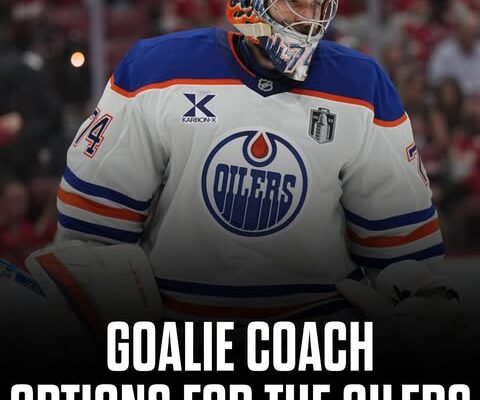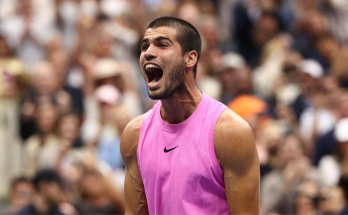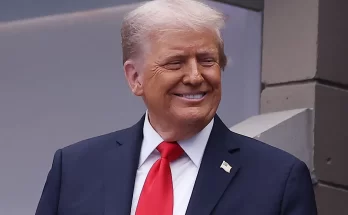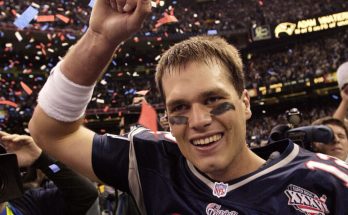Jason Gregor from Oilersnation highlighted several potential candidates the Edmonton Oilers could or should explore as options for their next goaltending coach.
Jason Gregor of Oilersnation recently turned his attention to one of the more crucial but often overlooked positions within the Edmonton Oilers organization: the goaltending coach. In a league where goaltending can make or break a team’s playoff aspirations, the Oilers’ search for a new voice to guide their netminders is more than just a minor coaching shuffle. It could be a pivotal decision that impacts the trajectory of the entire franchise. With that in mind, Gregor outlined a number of intriguing candidates, all of whom bring unique philosophies, experience, and skill sets to the table. The goal is simple: find someone who can elevate the goaltending department into one of the team’s strengths rather than a persistent area of concern.
The Oilers’ goaltending situation has been one of the more inconsistent areas of the roster over the past few seasons. Despite the emergence of Stuart Skinner and flashes of brilliance from other netminders, the team hasn’t consistently received elite-level goaltending when it has mattered most. Whether that’s been in the late stages of the regular season or in high-pressure playoff series, there have been moments where the goaltending has either held strong or crumbled under pressure. A reliable goaltending coach can make a significant difference—not just in technique and performance but in confidence, preparation, and in-game adjustments. This is why Gregor’s list of potential replacements wasn’t just tossed together without merit. Each name represents a possible shift in the way the Oilers handle the development, training, and mental readiness of their goalies moving forward.
One candidate Gregor mentioned is Dustin Schwartz, the Oilers’ long-time goalie coach, whose future with the organization remains uncertain. While Schwartz has his supporters and a strong relationship with several players on the team, including Stuart Skinner, some within the fanbase and media have pointed to his tenure as being too lengthy without the sort of breakthrough development one might expect. There is a belief that a new voice could spark different results, particularly with how goalies prepare and how they adjust in-game. It’s not so much a reflection of Schwartz’s failures as it is a recognition that sometimes a new perspective can unlock new potential. That said, retaining him in some capacity isn’t out of the question, especially if the Oilers see value in continuity and familiarity.
Another intriguing name on Gregor’s radar is Jussi Parkkila, currently serving as the goaltending coach for the Colorado Avalanche. Parkkila has helped guide goaltenders like Alexandar Georgiev and Darcy Kuemper, bringing a European sensibility and technical precision to the crease. His work in Finland prior to joining the NHL ranks was widely respected, and he has shown the ability to tailor his coaching style to different types of goaltenders. If the Oilers are looking for someone with championship pedigree, Parkkila certainly fits the bill. His influence on the Avalanche’s consistent goaltending has been evident, and he could bring that same level of stability and preparation to Edmonton.
Gregor also raised the possibility of seeking a younger, more progressive voice in the goaltending world—someone who may not have decades of NHL experience but brings a cutting-edge, analytical approach. In today’s NHL, data is increasingly becoming a core part of how teams evaluate performance, including goaltending. Coaches who embrace this philosophy can provide breakdowns not just based on traditional save percentage or goals-against average but on expected goals, shot quality, rebound control metrics, and situational tendencies. This sort of detailed, modern analysis could complement a goalie’s physical preparation by giving them a deeper understanding of their weaknesses and the tendencies of shooters around the league.
One such coach who fits that mold is Marco Raimondi, a rising name in goalie development circles known for his work with minor league and junior goalies in Europe. While he doesn’t have an NHL resume, Raimondi’s approach has caught the attention of scouts and player development departments around the league. His methods combine biomechanics, cognitive training, and situational simulation. For an organization like the Oilers—who may want to build a long-term goalie pipeline rather than just fix the NHL crease—hiring someone like Raimondi could be an investment in the future. It’s a bold direction but one that could pay off, especially given the growing number of European netminders succeeding in the league today.
There is also the option of hiring someone with a strong playing background who has recently transitioned into coaching. Gregor floated the idea of someone like Mike Smith, the recently retired NHL veteran and former Oiler. Smith has a well-known presence in the locker room and earned respect for his work ethic, preparation, and fiery competitive nature. He’s someone who understands the unique pressures of playing in a Canadian market, and he already has an established rapport with current Oilers goalies. The transition from player to coach can be difficult, but if Smith has an interest in taking that next step, he could be a compelling fit. He may not have the technical coaching experience yet, but sometimes lived experience and relatability can be just as impactful.
Yet another name discussed is Steve Briere, the former goalie coach for the Toronto Maple Leafs. Briere helped develop Frederik Andersen, Jack Campbell, and others during his time in Toronto. While results varied, he’s seen as a strong communicator and someone who builds solid relationships with his goaltenders. His time in Toronto was marked by highs and lows, but he’s still widely respected in goalie circles for his understanding of the position and his willingness to tailor coaching plans to each individual’s style. A coach like Briere could work particularly well in a tandem situation, helping both netminders find rhythm and confidence throughout a long season.
If the Oilers decide to go with someone who has a strong track record of development at the AHL or junior level, they could consider someone like Andy Chiodo, who has served as the goaltending development coach for the Pittsburgh Penguins. Chiodo has a strong analytical approach, understands the NHL grind, and has had success nurturing young talent through a demanding system. With the Oilers prospect pool slowly developing, having a coach who can bridge the gap between Bakersfield and Edmonton could prove invaluable. Developing consistency from the bottom up ensures the organization isn’t scrambling for answers if an injury occurs or if a young goalie is called up prematurely.
Another important factor Gregor alludes to is the dynamic between the head coach and the goalie coach. With Kris Knoblauch now in charge behind the bench, there may be preferences in terms of coaching style, philosophy, and communication. Knoblauch has worked with different goalie coaches throughout his career, and the decision will likely involve collaboration between him, the front office, and the goalies themselves. It’s not just about who has the best resume on paper but who fits within the existing structure and who the players can trust to help them reach the next level.
This coaching decision also takes on heightened importance given the state of the Oilers’ competitive window. With Connor McDavid and Leon Draisaitl in their prime years and championship aspirations fully in focus, there is little room for error. Goaltending has to be a strength rather than a liability. That’s why Gregor’s analysis is timely. It’s not just about finding someone to fill a position; it’s about making a strategic hire that can help push the team over the top. Whether it’s a more experienced NHL coach or a younger, analytics-driven thinker, the Oilers have options—but they must choose wisely.
Ultimately, the search for the next goalie coach is part of a broader conversation about how the Oilers want to build their team identity. Defense, structure, discipline, and elite goaltending are all interconnected, and this hire could be one of the most consequential behind-the-scenes decisions the organization makes this offseason. Jason Gregor’s breakdown of the available options provides a glimpse into how many different paths the Oilers can take. Whether they opt for a familiar face, a progressive mind, or a proven winner, the goal remains the same: improve the team’s goaltending results and give this talented core every possible chance to finally reach hockey’s ultimate prize.



